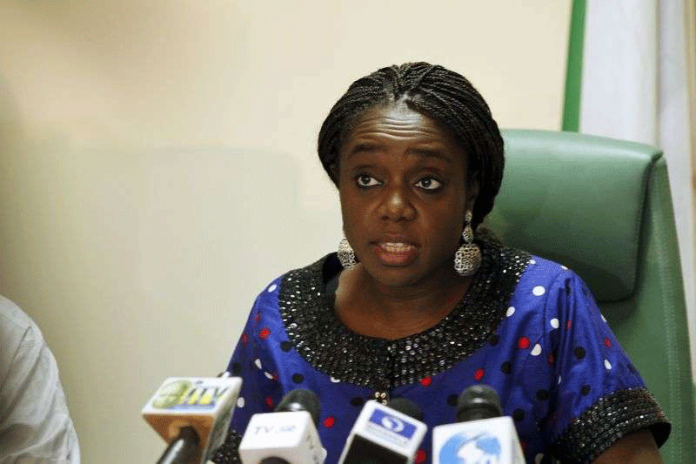The Federal Government Wednesday disclosed that it has identified more agencies collecting revenue in foreign currency but remitted it in naira to the Central Bank of Nigeria (CBN).
In a similar vein, the government has refuted reports that President Muhammadu Buhari withdrew the 2016 budget presented to the National Assembly.
Speaking to State House Correspondents after the Federal Executive Council (FEC) meeting presided over by President Buhari, Minister of Finance Kemi Adeosun said a comprehensive audit of all agencies that collect money in foreign currency but remit in Naira is still ongoing.
She said, “We have done a comprehensive audit of all the agencies that actually collect money in foreign currency but remit in Naira. The requirement is that such monies should go to the CBN which should exchange the money into Naira.
“What we discovered is, some agencies have been doing that. We have stopped it, but we are now doing an audit to identify other agencies. So far, we have identified the agency concerned was NIMASA.”
The minister disclosed that other agencies have also been discovered to collect funds in foreign currencies, including foreign missions, adding, “we are doing a full audit of all those accounts to ensure that all those revenues are now converted in accordance with the extant procedures and guidelines.”
She said the budget is not being withdrawn or replaced; but that it had been presented and it will go through the normal process whereby MDAs will defend their budgets.
There had been reports that President Buhari had written to the National Assembly requesting to withdraw the N6.08 trillion budget proposal he had presented on December 22, 2015.
She said, “Let me just speak to you about the budget process. The budget is presented to NASS and then there is what we call an interactive budget approval process, and you know the agencies will still go and defend their budgets at NASS.
“So ordinarily, in budget processes anywhere in the world, there can be amendments to the budget arising from that interactive process, which is normal.
“But let me make it very clear; the budget is not being withdrawn or replaced. The budget has been presented and it will go through the normal process whereby MDAs defend their budgets.
“It is possible in the process of that, because, as you know, the legislature is not a rubberstamp – their job is to scrutinize the budget and to approve that budget, so there may be some changes that occur as a result of that interactive process. But that process is normal everywhere in the world where a budget is presented. So I think it is important to make that clarification.”
She further explained that the principal discussion in the FEC meeting was the initiative by the federal government to plug leakages in revenue generating MDAs.
She said the presentation to FEC was to remind ministers who supervise these revenue generating boards of their responsibilities under the Fiscal Responsibility Act.
The finance minister also lamented that the government had discovered that many agencies had never credited any funds and never generated any operating surplus, including some whose salaries, overheads and capital are paid by the federal government. According to her, these agencies generate revenue and spend it without any form of control.
She explained that in non-oil economies, these are the revenues that the government runs on, adding that it was because Nigeria had oil in the past that nobody really bothered to pay attention to the MDAs as a revenue stream.
“Let me remind you that under FRA, these boards and corporations which generate revenue are supposed to generate operating surplus, 80 percent of which is to be credited to the Consolidated Revenue Fund.
“So one of the big initiatives and changes of this administration is to bring all those agencies into line; to insist that they must submit a budget; that budget must be subject to approval and they must operate within that budget so that the surplus that is meant to come to the Federal Government can be seen to be used as appropriate.
“The expected outcome of this is that the internally generated revenue (IGR) which the new budget is banking on will actually become a reality.”
Adeosun insisted that government revenue cannot continue to leak as had been the case in the past.
“We are going to make every Naira count, and in order to make every Naira count, we have to know how much is coming in and control how it goes out,” the minister said.
“All the ministers concerned agreed that enough is enough and they even identified boards and agencies under them where they know that revenue is being diverted.
“So the key message is that change has now come to those agencies, boards of those corporations, which had hitherto been operating without any control, as we are reining them in and making sure that money generated for all Nigerians is spent according to approvals and any surplus then comes into the Consolidated Revenue Fund (CRF) to be used to fund other areas of government.”
On the alleged ‘padding’ (inclusion of suspicious items for fraudulent reasons) of the budget by MDAs, she described any agency that is thinking of doing that as unpatriotic and unserious in view of the current price of crude oil.
“To answer that question,” the minister said, “let me give a context: Oil price has come down from $112 to $34-$35; anybody that is talking about padding any budget when there is no revenue is just not serious. It is unpatriotic and unrealistic.
“There can be no padding of budget when revenues are so thin and one of the things that I think that the budgeting process is doing is pruning down unnecessary expenditure.”
According to her, the government is going to set up the Efficiency Unit which is going to look into how money is spent, and how to make savings “because the money just isn’t there.”
“I don’t think this administration is part of that and, secondly, I think, at this level, I don’t think there can be anything like that,” she said.
-Leadership













